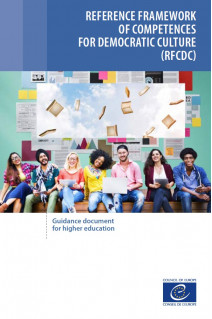Education is to society what oxygen is to living beings: we cannot exist without it...
The Council of Europe Reference Framework of Competences for Democratic Culture (RFCDC) sets out 20 competences our education system should develop in students to prepare them for lives as active citizens in democratic societies. The competences included are organised in four clusters: values, attitudes, skills and knowledge and critical understanding.
This publication explores how the RFCDC can be used in higher education. As much as any other level of education, higher education fosters a culture of democracy through the transversal competences it develops in all its students, the way in which institutions are run, how the members of the academic community interact, and how higher education institutions see themselves and behave as actors in society at large. The full implementation of the RFCDC (or “CDC Framework”) requires a whole-institution approach that makes the promotion and fostering of competences for democratic culture an institutional priority for policy as well as practice. This guidance document offers suggestions for teaching, learning and institutional policy.
CHAPTER 1 – WHY COMPETENCES FOR DEMOCRATIC CULTURE ARE IMPORTANT FOR HIGHER EDUCATION
CHAPTER 2 – WHO IS THIS GUIDANCE DOCUMENT FOR?
CHAPTER 3 – PURPOSE AND OVERVIEW
CHAPTER 4 – THE SPECIFICITIES OF HIGHER EDUCATION
CHAPTER 5 – DEVELOPING AND PRACTISING COMPETENCES FOR DEMOCRATIC CULTURE IN HIGHER EDUCATION
5.1. Teaching and learning
5.2. Research
5.3. The civic role of higher education
CHAPTER 6 – GOVERNANCE AND COMPETENCES FOR DEMOCRATIC CULTURE
CHAPTER 7 – WHOLE-INSTITUTION APPROACH
7.1. The added value of a whole-institution approach to CDC
7.2. Institutional governance and culture and co-operation with the community
7.3. How to apply a whole-institution approach to developing CDC in practice
CHAPTER 8 – WAYS FORWARD
REFERENCES






